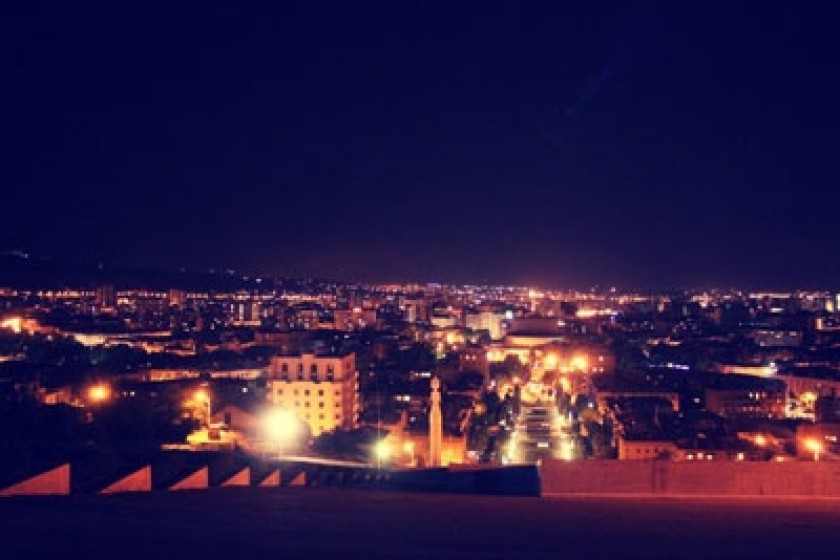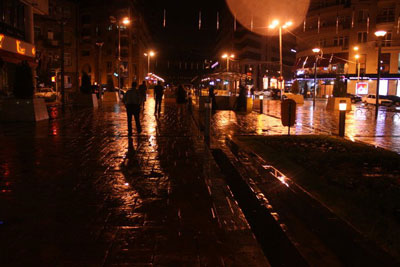
An American in Armenia: Day 18 – Our Early and Naïve Perceptions of Armenia
Samuel Armen
It was always an understanding of mine that one does not visit a foreign country simply to fit in, but instead to witness the new; to view that which one does not fit into. In short: to experience something that they have never experienced before.
I’ve arrived at this philosophy for two reasons alone:
First, it would be incredibly idiotic for one to assume that he or she could naturally camouflage in an entirely different environment.
Second, the beauty of culture is that it represents the deepest layer both of our individualization and unification. Culture separates groups, but brings the members of those group close together with common music, dance, literature, language, art, interpretation, religion, philosophy, politics etc.
The Armenian experience is not one that can be conjured up in a single article, but I will try to elucidate exactly what the interns and I perceived with what I can admit are mostly naïve observations. But that is the precise revelation of this article: to display our superficial and surface-layer perceptions of Armenia.
Though it was only my 18th day, I noticed our entire group along with several Spyurka-Hyes (Diaspora Armenians), had already passed judgments with consistency.
One particular female told me that she was becoming increasingly distressed by the way the local Armenian men treated her. Her main complaint was that the men eyed her in what she believed to be an inappropriate manner.
“These locals don’t know how to look at a woman,” She claimed.
To this accusation, I was forced to ask her to elaborate.
“How should they look at you?” I asked.
She began with a long tirade of equality, femininity, women’s rights and continued to compare Armenian culture to American culture.
I wanted to explain to her that America – with its consistent depictions of scantily clad women in the media and linking females to mere sexual representations – often portrays women in a very negative light. But to truly comprehend why the men do this, one must understand that Armenian-Armenians are of a different culture than American-Armenians. This might seem obvious in totality, but Diaspora Armenians tend to forget that this manifest into many individual differences.
 For example, in Yerevan at 11AM on any given day, one might notice hordes of beautiful Armenian women, dressed in what Americans would call “formal attire” and done up with makeup. The men are also dressed up – wearing black shoes, button downs, and pressed pants – no matter the occasion or time.
For example, in Yerevan at 11AM on any given day, one might notice hordes of beautiful Armenian women, dressed in what Americans would call “formal attire” and done up with makeup. The men are also dressed up – wearing black shoes, button downs, and pressed pants – no matter the occasion or time.
Before I generalize or offend anyone, I wish to state that our group of interns were mostly from liberal cities and states within a very liberal country.
In fact, 15 out of 21 of our interns are from New York (5), Los Angeles (6), San Diego (1), and Philadelphia (3) – all of which are cities identified as being Democratic.
According to the 2008 election results:
54% of San Diegans voted for Obama
68% of Los Angeles citizens voted for Obama
83% of Philadelphians voted for Obama,
85% of New Yorkers voted for Obama
This means that more than 2/3rds of our group grew up in at least a moderately Liberal environment (within a country that is extremely liberal in relativity to most of the world).
Diaspora Armenians differ from the locals in that we dress, talk, walk, eat, and even party differently. We stand out in ways that we could not fathom.
The true answer as to why the men looked at her is admittedly backwards, but rather quite simple: It seems, at the very most, to be a matter of respect.
One does not enter a church in a bath robe; one does not shout in class. Yerevan is one of the few capital cities in the world that has maintained a firm grip on its own cultural traditions, including dressing formally throughout the week. When a girl or boy deviates from this, he or she appears largely abnormal (even lascivious at times).
These unbroken traditions seem to have unmistakable benefits as well. In Armenia crime is very low and hospitality is very high. If you remotely resemble an Armenian and you rub your stomach in front of an Armenian mother, she may very well invite you – a complete stranger – to come inside and eat the inevitable feast she will prepare for you in under an hour.
Before coming to Armenia, Diaspora Armenians should at least be aware of some generally accurate qualities of Armenia.
1. If you speak Western Armenian, there is a high chance that you will either A. be misunderstood or B. be given lousy service. Many interns have come across the situation where they have asked “Chur oonis?” (Do you have water?) in a restaurant and have gotten nothing but confusion. This always ends with a waiter or waitress asking if when they asked for ‘Chur’ they actually meant ‘Jur’. It would seem absurd if this didn’t happen more than five times.
2. Everyone speaks Armenian, more than 2/3rds of the citizens speak Russian, and a little less than a quarter of Armenians are actually conversational in the English language. There is also a considerable minority that speaks either Spanish or French.
 3. A taxi fare should never be over 600Dram (~$1.62) if you are traveling from two different points within central Yerevan. If you walk into a cab and the meter is not running, chances are you are going to be ripped off. In many cases, the cab drivers will blatantly lie that they do not have change. For most of the interns and me, this wasn’t a matter of finance, but rather of principle: No one wants to get cheated.
3. A taxi fare should never be over 600Dram (~$1.62) if you are traveling from two different points within central Yerevan. If you walk into a cab and the meter is not running, chances are you are going to be ripped off. In many cases, the cab drivers will blatantly lie that they do not have change. For most of the interns and me, this wasn’t a matter of finance, but rather of principle: No one wants to get cheated.
4. Armenia can best be understood as a country that has not fully shaken off the cobwebs of its Soviet rule. Many good and bad qualities arise from this invisible but palpable communistic essence within the citizens. A bad quality is the fact that Armenian citizens generally have this attitude that there is some monolithic force dominating everything, and it is something they can not stop or even affect. One can title this force whatever they want, but the fact remains that the people often feel a sense of helplessness when it comes to control of their society.
A good result of the remnants of Armenia’s Soviet mentality comes from the following story:
Communism, in its most ideological representation, runs on a system of fairness and equality. One night, one of the interns was locked outside of her apartment at 3AM. The key inside of her door was jammed. The first time this happened I was able to wrestle it out, but this time it was completely hopeless. In a moment of panic, this female intern ran downstairs and asked the nearest person for help. The man was strong, had a stern appearance, and was between 25 and 30 years old. Without hesitation, this man agreed to help, walked upstairs and spent forty-five minutes meticulously taking the door knob apart. When we thanked him and offered him some sort of reward he refused politely and told us he was tired. He asked us if everything else was fine, and did not leave until he was convinced that the door was fixed.
Again, this was the little understanding we began gathering after living in Armenia for just under three weeks. The true best advice I have for anyone coming to this beautiful country is to remember that one must keep an open mind if he or she wants others to keep their minds open to them.
 Videos
Videos Photos
Photos
Comments (7)
Write a comment